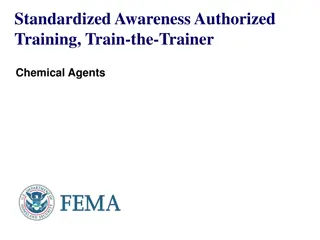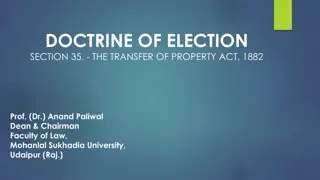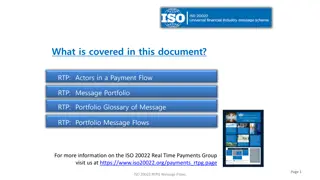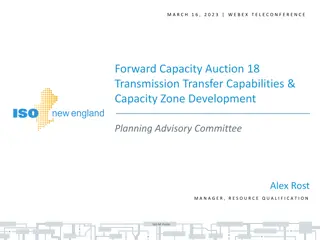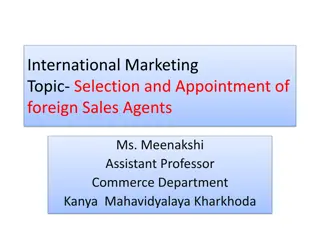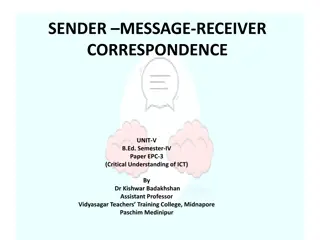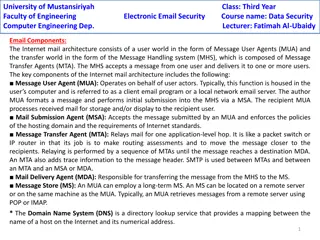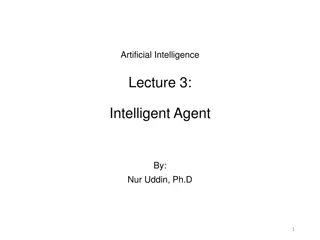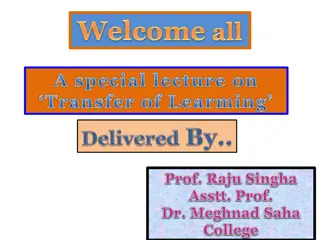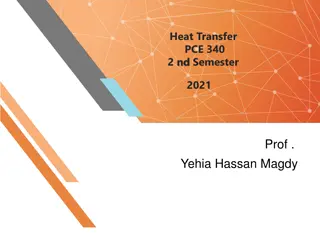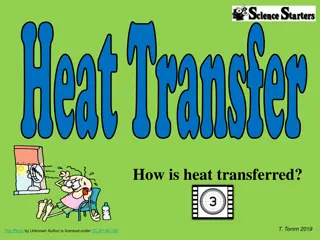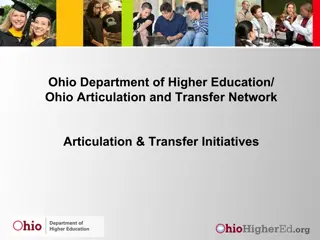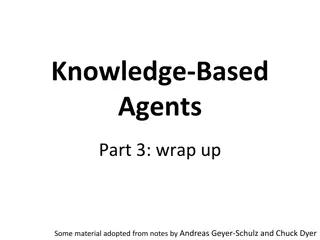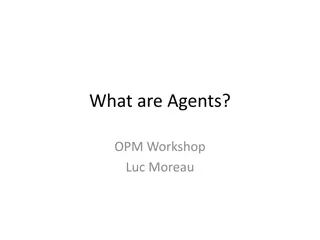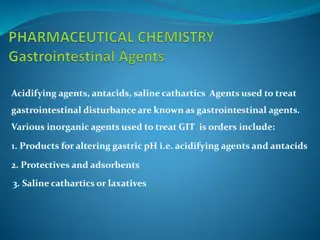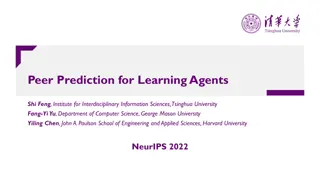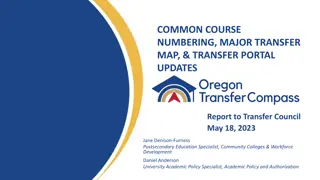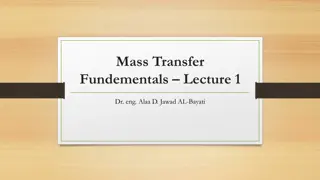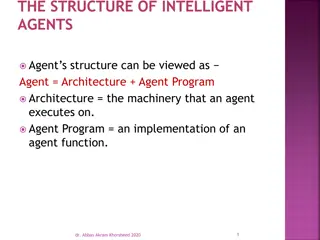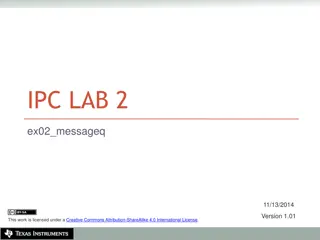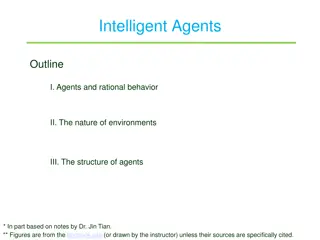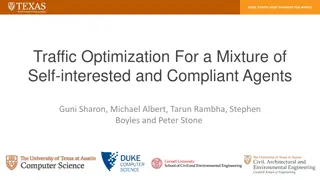Heat Transfer Labels Manufacturer, Supplier in India
Heat Transfer labels are labels where ink pigment and metalized layer is transferred from film to the product to be decorated. Transfer is done by heat & pressure on Heat transfer machine. The whole image is transferred in one single process. Heat Transfer process is solving the deficiency of other
2 views • 5 slides
COMPUTER ORGANISATION Register Transfer Language
Register Transfer Language is a symbolic notation used to describe the micro-operations transferring data among registers in computer organisation. It signifies the availability of hardware logic circuits to perform specified micro-operations and transfer results between registers. Register Transfer
6 views • 7 slides
Chemical Agents Awareness Training Overview
This training module covers standardized awareness and authorized training on chemical agents, including toxic industrial chemicals, riot control agents, and chemical warfare agents. Participants will learn about the physiological signs/symptoms, advantages/disadvantages of using chemical agents for
1 views • 20 slides
Understanding Transfer Pricing in Organizational Decision Making
Explore the concept of transfer pricing in organizational decision-making, including factors affecting transfer prices, objectives of transfer pricing, and how it influences the autonomy and profitability of responsibility centers. Learn about different bases for setting transfer prices and examples
0 views • 13 slides
Gas-Liquid Equipment in Mass Transfer Operations
Gas-liquid operations play a crucial role in mass transfer processes by facilitating intimate contact between the two fluids for efficient interphase diffusion. Various equipment such as sparged vessels (bubble columns) and mechanically agitated vessels are used to disperse gas or liquid phases, pro
2 views • 27 slides
Understanding Transfer of Command Procedures in Incident Management
The Transfer of Command lesson delves into the process of shifting incident command responsibilities, outlining reasons for transfer, and discussing how a more qualified individual's arrival does not always necessitate a change in command. The lesson emphasizes the importance of face-to-face transfe
1 views • 11 slides
Ultimate Guide to UC Transfer Admission Guarantee (TAG) Program
Explore the Transfer Admission Guarantee (TAG) program for highly competitive California community college students looking to transfer to University of California (UC) campuses like UC Davis, UC Irvine, UC Merced, UC Riverside, UC Santa Barbara, and UC Santa Cruz. Learn about TAG criteria, particip
9 views • 21 slides
Doctrine of Election under Section 35 of the Transfer of Property Act, 1882
The doctrine of election under Section 35 of the Transfer of Property Act, 1882 deals with situations where a person professes to transfer property he does not own, and the owner must elect to confirm or dissent. If the transfer is gratuitous and the transferor is unable to make a fresh transfer, th
5 views • 17 slides
Real-Time Payments: Actors and Message Flows Overview
This document provides an overview of the actors involved in a payment flow and the message portfolio in Real-Time Payments (RTP). It includes details on various actors like Instructing agent, Forwarding agent, Ultimate Debtor, Reimbursement agents, and more. The provided message flows illustrate th
1 views • 12 slides
Update on Forward Capacity Auction 18 Transmission Transfer Capabilities
This update covers the progress and developments surrounding the Forward Capacity Auction 18 (FCA 18) transmission transfer capabilities, Capacity Zone Development, and ongoing analyses in New England's power system. The ISO-NE has been actively reviewing interface transfer capabilities, discussing
1 views • 25 slides
Exploring Logical Agents and Architectures in Wumpus World
Explore the use of logical agents in the Wumpus World domain through three agent architectures: reflex agents, model-based agents, and goal-based agents. Understand how these agents operate in the challenging environment of the Wumpus World, where the task is to find the gold, return to starting pos
0 views • 21 slides
Selection and Appointment of Foreign Sales Agents: A Comprehensive Guide
Learn about the process of selecting and appointing foreign sales agents in international marketing, including the meaning of agency, content of foreign sales agency contracts, reasons for appointing agents, factors influencing agent selection, as well as the advantages and disadvantages of working
1 views • 12 slides
Understanding Sender, Message, Receiver Correspondence in Communication Process
Communication process involves sender, message, and receiver elements. The sender initiates communication, generates a message, and conveys it to the receiver. The message is encoded, transmitted through a channel, and decoded by the receiver. Noise can hinder the communication process by interferin
1 views • 13 slides
Understanding Internet Mail Architecture Components
The Internet mail architecture consists of key components including Message User Agents (MUA), Mail Submission Agent (MSA), Message Transfer Agent (MTA), Mail Delivery Agent (MDA), and Message Store (MS). These components work together to facilitate the sending, receiving, and storing of email messa
6 views • 4 slides
Understanding Intelligent Agents in Artificial Intelligence
Intelligent agents in artificial intelligence act rationally to achieve the best outcomes in various environments. They operate autonomously, perceive their surroundings, adapt to changes, and pursue goals efficiently. Developing intelligent agents involves examining agents, environments, and their
1 views • 22 slides
Understanding Antineoplastic Agents in Pharmaceutical Chemistry
Antineoplastic agents, such as alkylating agents, target DNA or DNA replication to induce apoptosis in cancer cells. Alkylation of DNA can lead to cell death through various mechanisms, including p53 activation. Resistance to alkylating agents can develop in cancer cells. The process involves nucleo
1 views • 94 slides
Understanding Adjuvants and Herbicide Formulation
Adjuvants are additives that enhance herbicide effectiveness, crucial for optimal weed control. Types include surfactants, stabilizing agents, coupling agents, humectants, deposit builders, and more. Surfactants aid in wetting and spreading herbicides, stabilizing agents keep suspensions intact, cou
0 views • 10 slides
Understanding the Impact of the Tenants Fee Ban on Landlords and Agents
The Tenants Fees Act bans all fees from letting agents and landlords to tenants, impacting the rental market significantly. This article explores what can be charged to tenants, reasons for using an agent, services provided by agents, and insights from landlords on the changing landscape post-ban. A
0 views • 13 slides
Understanding Transfer of Learning: Types and Examples
Transfer of learning refers to the carry-over of habits, knowledge, or skills from one area to another. This process influences performance in various situations, as seen in positive and negative transfer examples. Various definitions and types of transfer learning are explored in this special lectu
0 views • 21 slides
Understanding Heat Transfer in Engineering Applications
This content covers various aspects of heat transfer in engineering, including calculations for thermal resistances, heat transfer between different surfaces and mediums, and practical applications such as heat transfer in pipes, plates, and spheres. It also includes review questions involving heat
0 views • 8 slides
Understanding Agency Relationships in Business
Agency relationships in business involve principals appointing agents to act on their behalf. There are different types of agents, such as general agents, special agents, factors, brokers, del credere agents, confirming houses, and commercial agents. Each type of agent has specific roles and respons
0 views • 18 slides
Understanding Heat Transfer in Science
Investigate and understand the movement of heat between objects through conduction, convection, and radiation. Learn to compare materials that conduct heat with insulating materials, describe heat transfer processes, and design experiments to study heat energy movement. Explore the use of ratio reas
0 views • 31 slides
Understanding Intelligent Agents in Chapter 2
This chapter delves into the concept of agents and environments in the realm of intelligent systems. It explores the types of agents, their functions, and interactions with environments. Rationality, performance measures, and the essence of being a rational agent are key aspects discussed. The vacuu
0 views • 28 slides
Understanding Heat Transfer Mechanisms
Heat transfer is a fundamental concept in physics, involving the movement of thermal energy between objects. This interactive content explores different types of heat transfer such as conduction, convection, and radiation. It discusses how heat is measured, the properties of various materials in con
0 views • 4 slides
Ohio Department of Higher Education and Transfer Initiatives
Ohio Department of Higher Education focuses on transfer initiatives like Transfer Guarantees, Advanced Placement, CLEP Credits, Guaranteed Transfer Pathways, and more to help Ohioans achieve postsecondary credentials by 2025. They offer Transfer Modules, Transfer Assurance Guides, and Career-Technic
0 views • 20 slides
2013 Membership Development Award: Young Agents Committee Success Story
The Young Agents Committee of the Independent Insurance Agents of Georgia, Inc., won the 2013 Membership Development Award for their outstanding recruitment and retention efforts. Their theme focused on perpetuation, increasing active membership by 36%. Through grassroots development, live registrat
0 views • 10 slides
Understanding Leavening Agents in Baking
This content delves into the importance of leavening agents in baked goods, discussing natural leavening agents, the chemical processes of baking soda and baking powder, the role of yeast leavening, and the differences between quick breads and other baked products. It also covers the leavening agent
0 views • 9 slides
Understanding Knowledge-Based Agents: Inference, Soundness, and Completeness
Inference, soundness, and completeness are crucial concepts in knowledge-based agents. First-order logic allows for expressive statements and has sound and complete inference procedures. Soundness ensures derived sentences are true, while completeness guarantees all entailed sentences are derived. A
0 views • 6 slides
Understanding Agents in OPM Workshop by Luc Moreau
Delve into the concept of agents in OPM Workshop facilitated by Luc Moreau. Explore the nature of agents, their differences from artifacts, causes of their behavior, and challenges in their utilization. Discover the role of enactors, executables, and workflows in generating and controlling agents. U
0 views • 5 slides
Understanding Gastrointestinal Agents: Acidifying Agents, Antacids, Saline Cathartics
Gastrointestinal agents such as acidifying agents, antacids, and saline cathartics are used to manage gastrointestinal disturbances. Acidifying agents like Hydrochloric Acid aid in gastric digestion, while antacids help reduce gastric acidity. Saline cathartics are used as laxatives. Achlorhydria, a
0 views • 36 slides
Understanding Peer Prediction Mechanisms in Learning Agents
Peer prediction mechanisms play a crucial role in soliciting high-quality information from human agents. This study explores the importance of peer prediction, the mechanisms involved in incentivizing truthful reporting, and the convergence of learning agents to truthful strategies. The Correlated A
0 views • 7 slides
Transfer Council Updates and Subcommittee Progress - May 2023
The report covers updates on common course numbering, major transfer mapping, and transfer portal advancements presented to the Transfer Council on May 18, 2023. It includes details on subcommittee alignments for Math and Psychology, communication strategies, nominations, outcomes assessment progres
0 views • 9 slides
Fundamentals of Mass Transfer: Lecture Highlights with Dr. Alaa D. Jawad AL-Bayati
This content covers the basics of mass transfer, including the definition, types, properties used for mass transfer, mass transfer rate, Fick's law, and factors influencing transfer rate in chemical reactions. Dr. Alaa D. Jawad AL-Bayati provides insights into the mechanisms and processes involved i
0 views • 9 slides
Transfer Reform and Common Course Numbering Initiatives in California Higher Education
The Transfer Reform initiatives, including AB 928 and AB 1111, aim to improve student transfer achievement and streamline the transfer process in California's higher education system. AB 928 focuses on establishing a single lower-division general education pathway while AB 1111 implements a common c
0 views • 7 slides
Overview of Intelligent Agents: Structures and Types
The structure of intelligent agents consists of architecture and agent program. Different types of intelligent agents include simple reflex agents, model-based reflex agents, goal-based agents, and utility-based agents. Each type operates based on specific characteristics and methods to make decisio
0 views • 19 slides
IPC Lab 2 MessageQ Client/Server Example
This MessageQ example demonstrates the client/server pattern using SYS/BIOS heap for message pool, anonymous message queue, and return address implementation. The example involves two processors - HOST and DSP, where the DSP processor acts as the server creating a named message queue, and the HOST p
0 views • 12 slides
Understanding Intelligent Agents: Key Concepts and Rational Behavior
Intelligent agents operate based on perceptions, reasoning, and actions within various environments. Agents function through a sequence of percepts, utilizing programs to interpret their architecture. The Vacuum-Cleaner World serves as an illustrative environment for agent behavior, highlighting the
0 views • 31 slides
Understanding Alkylating Agents in Oncology: Mechanisms and Pharmacokinetics
Alkylating agents have a long history as anti-cancer drugs, with Mechlorethamine being the first developed in 1942. They react with cells in all phases of the cell cycle, causing DNA alkylation and cross-link formation. Common alkylating agents include Cyclophosphamide, Melphalan, and Temozolomide.
0 views • 75 slides
Traffic Optimization for Self-interested and Compliant Agents
In this study, Guni Sharon, Michael Albert, Tarun Rambha, Stephen Boyles, and Peter Stone explore traffic optimization for a mixture of self-interested and compliant agents. The research delves into routing flows of agents across networks and analyzes equilibrium scenarios. The motivation behind the
0 views • 20 slides
Understanding Antimicrobial Agents and Their Mechanisms of Action
Antimicrobial agents play a crucial role in combating harmful microorganisms. They encompass various categories such as antiseptics, disinfectants, germicides, and bacteriostatic agents. Each category targets different types of microbes and serves specific purposes in maintaining public health stand
0 views • 40 slides


